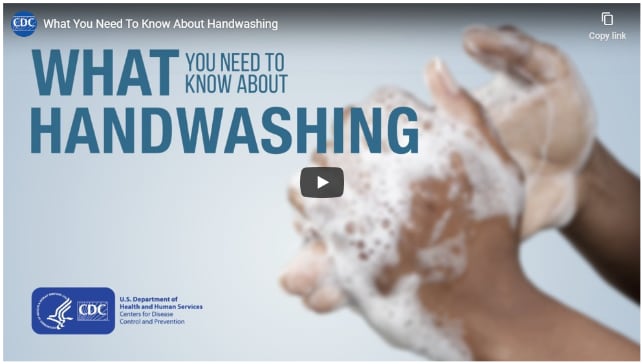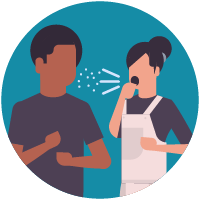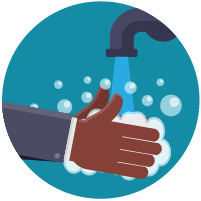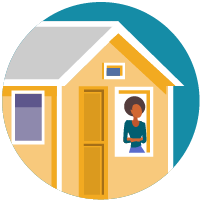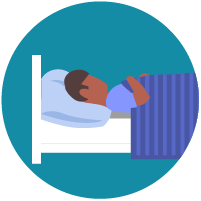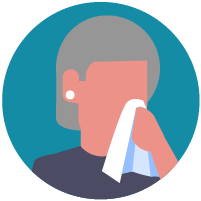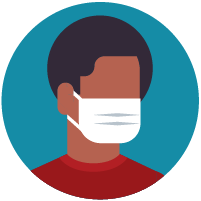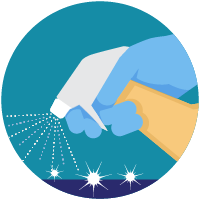COVID-19 update
COVID-19 Antibody Test Near You
- Request COVID-19 antibody test online
- Testing through Quest Diagnostics
- No hidden fees
- Results typically in 4 business days
FDA approved testing from nations largest clinical lab.
This serology blood test identifies the presence of antibodies that indicate that a person had an immune response to COVID-19 (also known as coronavirus or SARS-CoV-2). A positive result to this antibody (IgG) test indicates that you may have had previous exposure to COVID-19 and your body has developed antibodies.
Although It may take up to 14 days after the onset of symptoms for antibodies to be developed within the body, 91% of people develop such antibodies within the first 8-13 days. Some people infected with COVID-19 will never exhibit symptoms but will have a detectable antibody response. While there is belief that the presence of antibodies may provide immunity to future infections, there is not yet enough data to state this conclusively.
Who should get the test?
All interested persons who have had NO COVID-19 related symptoms for the last 10 days are good candidates for this test.
Patients with any active COVID-19 related symptoms (fever over 100.3°F, cough, sore throat or shortness of breath) should not purchase this test and instead contact their primary care physician or a local hospital for a COVID-19 diagnostic test.
To protect laboratory staff, please remember to wear either a face mask or some other form of face covering, like a scarf, when arriving at the laboratory. Please also refrain from visiting the laboratory if you have had symptoms or tested positive for COVID-19 within the past 10 days as you may still be contagious.
This is an antibody test used to detect the presence of antibodies, not to diagnose active infections.
Can I order this COVID-19 test in bulk for my workforce?
LabReqs.com can arrange bulk COVID-19 antibody testing for a workforce. Please email sales@labreqs.com for details.
Is this a blood test or a swab?
This test requires a blood draw because it detects IgG antibodies in the blood. Antibodies in the blood indicates a previous exposure to COVID-19. It takes up to 14 days after exposure for antibodies to be developed within the blood.
Is test FDA approved
This testing service is based on a newly released test system from Abbott. A complete independent validation study has been performed on this test. This test can aid in detecting the presence of immunoglobulin class G (IgG). Although IgG antibody response typically develops within 14 days after onset of symptoms, 91% of people develop antibodies within 8-13 days. Some people infected with COVID-19 will never exhibit symptoms.
The Abbott tests are marketed under FDA's Policy for Diagnostic Tests for Coronavirus Disease-2019. Abbott plans to submit for FDA Emergency Use Authorization (EUA). Results signify that antibodies are present, but protective immunity based on these results has yet to be established in clinical trials. Antibody tests by themselves are of limited value in the immediate diagnosis of a patient where COVID-19 infection is suspected.
What does antibody testing mean?
This serology blood test identifies the presence of antibodies which indicates that a person had an immune response to COVID-19 (also known as coronavirus or SARS-CoV-2). A positive result to this antibody (IgG) test indicates that you may have had a previous exposure to COVID-19 and your body has developed antibodies.
If you are exhibiting symptoms of COVID-19 such as a fever of over 100.3°F or a dry cough, you will not be able to enter the laboratory. This is an antibody test used to detect the presence of antibodies, not to diagnose active infections.
LabReqs.com urges you to follow up with your primary care physician or a local hospital for a COVID-19 diagnostic test if you believe you may have an active infection. If you are experiencing a life threatening emergency, please call 911.
Not available in New York, New Jersey, Rhode Island and Maryland. Only collections at Quest Patient service Center. Must be 18 and older.
Coronavirus: What you need to KNOW!
CORONAVIRUS UPDATE (3/19/20): If you believe you have been exposed to Coronavirus (COVID-19), please do not enter a patient service center. Immediately contact your physician or healthcare provider. Testing must be collected by a physician or an authorized healthcare provider.
Our top priority is always the health and safety of our patients, employees, and the communities we serve.
Part of that commitment is to help you get answers to the many questions you have about the coronavirus disease (COVID-19) and to make sure you know that you must go to your doctor for testing, if you have any reason to suspect you have COVID-19.
Who should get tested?
It’s important to reach out to your doctor immediately if you have any reason to suspect you have COVID-19.
The Centers for Disease Control and Prevention (CDC) recommends calling your doctor if you:
- Experience symptoms (fever, cough, shortness of breath)
- Have been in close contact with a person with COVID-19
- Have recently traveled from an area with a widespread outbreak
Don’t wait. Early detection means you can take precautions right away to limit the spread of the illness to those around you.
Where to get tested
You can only get tested for COVID-19 through your doctor. LabReqs doesn't provide lab orders for or collect COVID-19 specimens at Patient Service Centers.
Patients: Please do not go to a Patient Service Center for COVID-19 testing. Contact your healthcare provider for testing services.
|
COVID-19 |
Symptoms of COVID-19 mimic the flu, but it’s important to take either illness very seriously. Speak with your doctor to determine if your symptoms call for COVID-19 or flu testing. |
Simple steps for prevention
Protect yourself and your loved ones from COVID-19 with simple prevention methods. The CDC recommends that you:
- Avoid close contact with people who are sick
- Avoid touching your eyes, nose, and mouth
- Stay home when you are sick
- Cover your cough or sneeze with a tissue
- Clean and disinfect frequently touched surfaces
- Wash your hands often with soap and water
Know How it Spreads
- There is currently no vaccine to prevent coronavirus disease 2019 (COVID-19).
- The best way to prevent illness is to avoid being exposed to this virus.
- The virus is thought to spread mainly from person-to-person.
- Between people who are in close contact with one another (within about 6 feet).
- Through respiratory droplets produced when an infected person coughs or sneezes.
- These droplets can land in the mouths or noses of people who are nearby or possibly be inhaled into the lungs.
Take steps to protect yourself
Clean your hands often
- Wash your hands often with soap and water for at least 20 seconds especially after you have been in a public place, or after blowing your nose, coughing, or sneezing.
- If soap and water are not readily available, use a hand sanitizer that contains at least 60% alcohol. Cover all surfaces of your hands and rub them together until they feel dry.
- Avoid touching your eyes, nose, and mouth with unwashed hands.
Avoid close contact
- Avoid close contact with people who are sick
- Put distance between yourself and other people if COVID-19 is spreading in your community. This is especially important for people who are at higher risk of getting very sick.
Take steps to protect others
Stay home if you’re sick
- Stay home if you are sick, except to get medical care. Learn what to do if you are sick.
Cover coughs and sneezes
- Cover your mouth and nose with a tissue when you cough or sneeze or use the inside of your elbow.
- Throw used tissues in the trash.
- Immediately wash your hands with soap and water for at least 20 seconds. If soap and water are not readily available, clean your hands with a hand sanitizer that contains at least 60% alcohol.
Wear a facemask if you are sick
- If you are sick: You should wear a facemask when you are around other people (e.g., sharing a room or vehicle) and before you enter a healthcare provider’s office. If you are not able to wear a facemask (for example, because it causes trouble breathing), then you should do your best to cover your coughs and sneezes, and people who are caring for you should wear a facemask if they enter your room. Learn what to do if you are sick.
- If you are NOT sick: You do not need to wear a facemask unless you are caring for someone who is sick (and they are not able to wear a facemask). Facemasks may be in short supply and they should be saved for caregivers.
Clean and disinfect
- Clean AND disinfect frequently touched surfaces daily. This includes tables, doorknobs, light switches, countertops, handles, desks, phones, keyboards, toilets, faucets, and sinks.
- If surfaces are dirty, clean them: Use detergent or soap and water prior to disinfection.
To disinfect:
Most common EPA-registered household disinfectants will work. Use disinfectants appropriate for the surface.
Options include:
-
Diluting your household bleach.
To make a bleach solution, mix:- 5 tablespoons (1/3rd cup) bleach per gallon of water
OR - 4 teaspoons bleach per quart of water
Follow manufacturer’s instructions for application and proper ventilation. Check to ensure the product is not past its expiration date. Never mix household bleach with ammonia or any other cleanser. Unexpired household bleach will be effective against coronaviruses when properly diluted.
- 5 tablespoons (1/3rd cup) bleach per gallon of water
-
Alcohol solutions.
Ensure solution has at least 70% alcohol. -
Other common EPA-registered household disinfectants.
Products with EPA-approved emerging viral pathogens pdf icon[7 pages]external icon claims are expected to be effective against COVID-19 based on data for harder to kill viruses. Follow the manufacturer’s instructions for all cleaning and disinfection products (e.g., concentration, application method and contact time, etc.).
